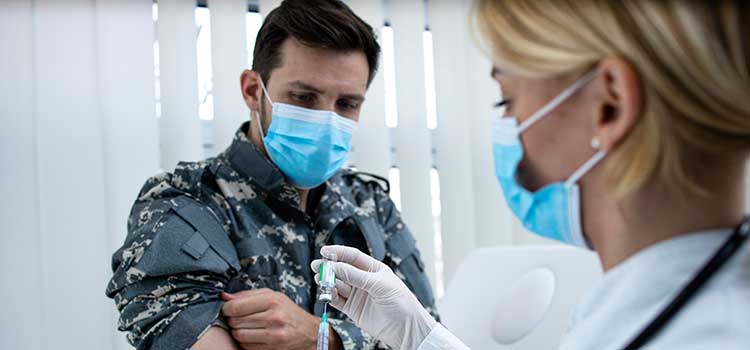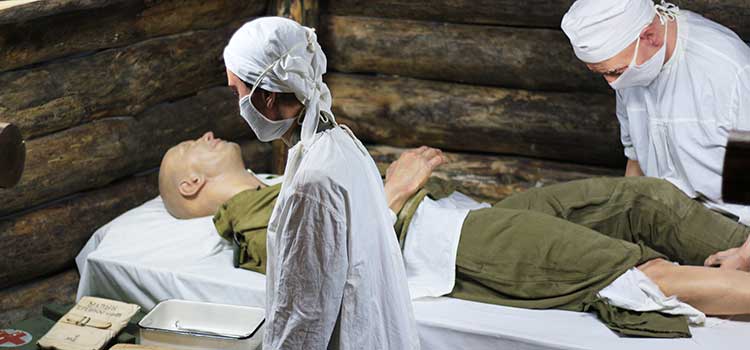How to become a military nurse (duties, education & salary)

Military Nurse Overview
Where you’ll work: Military hospitals, military clinics, field hospitals and attached to units.
What you’ll do: Provide care in a variety of specialties to military personnel, veterans and their families.
Minimum degree required: BSN required for nurses entering the military as an officer.
Who it’s a good fit for: Nurses who want to serve their country and make a difference in the lives of military personnel, as well as enjoy a host of unique benefits, may enjoy military nursing.
Job perks: Extensive military benefits, more job advancement opportunities and the possibility to get your nursing education paid for.
Opportunities if you pursue a higher degree or certification: Earning a specialty certification or getting an advanced nursing degree (such as an MSN or DNP) could lead to more job opportunities and a higher salary. Plus, the military may help pay for some or all of your additional education.
Median annual salary: $86,070
All nurses desire to make a difference in other peoples’ lives. Nurses in the military make a difference two-fold by also serving their country in the process. Military nurses care for military personnel in a wide range of specialties and get access to numerous exclusive benefits in exchange for their service.
However, joining the military is not a completely uniform process. Factors such as which branch of the military you choose to join, your education and your experience can all impact how you join, the training you receive and the length of service you must commit to.
In this Article
What is a military nurse? | Steps to become a military nurse | Requirements | Duties | What to expect | Salaries | FAQs
What is military nursing?
Nurses that serve in one of the branches of the United States Armed Forces are considered military nurses. The five primary branches are:
Nurses in the military can and are encouraged to specialize in a particular area. Critical care and psychiatric/mental health nursing are two specialties in especially high demand within the military, but you can specialize in just about anything.
A brief history of military nursing
The first women that served in the military at all were nurses. When the United States entered World War I, there were only 403 active-duty nurses in the Army, according to the Army Nurse Corps Association. By the end of the war, that number had risen to 21,460 officers with 10,000 of those nurses serving overseas. When World War II broke out, there were less than 7,000 nurses on active-duty, and by 1945, there were over 57,000—the largest number of nurses on active-duty in the history of the organization.
However, military nurses at that time were not authorized to hold any actual military rank or grade. As such, they didn’t have the commensurate authority, rights and privileges of their officer peers. This began to change in 1920 with the Army Reorganization Act. When this Act was passed, nurses were given relative ranks and could wear insignia. Relative ranking clarified the lines of authority and made it easier for nurses to give and execute orders, however, they still didn’t have the same authority and privileges of male officers of the same rank. Nurses couldn’t achieve full rank until after World War II, in 1947.
How to become a military nurse
Earn your BSN.

In order to become a registered nurse, you must earn either an associate degree in nursing (ADN) or a bachelor’s of science in nursing (BSN). The military is a little different, however. In general, nurses must have a BSN to qualify for entry into the military. There may be exceptions for nurses with sufficient prior experience, but if you only have your ADN, you may have to go back and get your BSN or complete additional training.
Participating in a program such as the Reserve Officer Training Course (ROTC) during nursing school and commissioning as an army nurse right out of college is also another option. The ROTC also offers scholarships that can pay for your BSN.
Get licensed as an RN.

Nurse graduates must pass the NCLEX-RN exam to qualify for licensure. First, you need to apply for a license with your state’s nursing regulatory body (NRB). Check with your NRB to find out how to apply for a license and register for the NCLEX exam, since the process varies a bit from state to state. Once you pass the NCLEX and complete your application, you should be issued your RN license.
Gain experience.

The military typically prefers new nurses to have about a year or more of experience before they join the military. This is especially true if you want to specialize. Taking the time to get some experience working in a hospital or other healthcare setting can set you up for success. (Nurses that chose to commission through ROTC do not need prior nursing experience).
Contact a recruiter.

Once you have some experience under your belt, you should talk to a recruiter within the branch(es) you’re interested in. They can answer all your questions about the length of service you must commit to, the training you have to receive, what the nursing experience is like and much more. Nurses that participated in and commissioned through ROTC do not have to go through a recruiter as that process is already completed through ROTC.
Complete the required training.

Once you join the military, you can expect to attend some kind of training course which typically lasts several months long. The exact length and location varies depending on what branch you are in. Newly commissioned Army Nurse Corps officers, for example, attend a Direct Commission Course (DCC) followed by a nine-week Basic Officer Leader Course (BOLC).
Move up the ranks.

After completing your required training, the real work begins. Military nurses typically work in military and field hospitals, military clinics and more. If you wish to advance your education to become an advanced practice registered nurse (APRN), the military will likely help pay for that education in exchange for extended service obligations.
Requirements to become a military nurse
The requirements and steps to becoming a nurse in the military vary based on a few crucial factors, including whether or not you are already an RN and what branch you intend to join. Every branch does things a little differently—speaking with a recruiter directly is the best way to get your questions answered and find out precisely what you’re in for.
In general, however, you must satisfy the following to become a nurse in the military:
If you are already an RN with some experience…
If you’re already an RN, you’ve already completed your nursing education and obtained a nursing license from your state’s nursing regulatory body (NRB). Nurses who fall into this category should have a BSN and have at least a year of experience before joining the military. If you obtained your nursing license with an ADN, you may need to go back to school before you can join.
If you are interested in joining at that time, you should speak to a recruiter in the branch(es) you are interested in. They can tell you what kind of commissioning opportunities are available depending on your experience level and specialty. Some nurses may also be eligible for accession bonuses and/or student loan repayment. Of course, these kinds of monetary boons are always in exchange for a certain length of service.
In most cases, existing nurses enter the military as officers after they complete the required training. For nurses joining the Army, for example, you will most likely go through the Army Medical Department (AMEDD) Direct Commission Course (DCC) followed by the Basic Officer Leader Course (BOLC). The DCC teaches you military and Army-specific basics, things like formations, putting on a uniform, saluting and the like. BOLC dives deeper into your duties, obligations and training as a nursing officer. This does include some tactical, survival and weapons training as well.
After completing training, you’ll be a full-fledged military nurse and commissioned officer (CO).
If you aren’t an RN yet…
If you’re in high school, in college or are thinking of going back to school to earn a nursing degree, you may be able to get your entire education paid for. Programs like the Army Reserve Officers’ Training Corps (ROTC)—which several other military branches have their own iterations of—is a scholarship program that pays for your tuition and other expenses (or at least a portion of it, depending on your eligibility) in exchange for a specified amount of service, typically eight years.
To receive any ROTC scholarship, you must satisfy the following:
Graduates finish school as an Army Officer. The ROTC program is only available at schools that offer it, meaning it’s not available everywhere. You can apply for the program while you’re in high school or if you’re already in college.
If you are already an enlisted soldier in the military and you want to become a nurse…
Current enlisted soldiers may be eligible to have a BSN education paid for by the military.
The Army’s AMEDD Enlisted Commissioning Program (AECP), for example, provides Army, Army Reserves and Army National Guard enlisted soldiers with the opportunity to complete their BSN. The Army may pay up to $15,000 per academic year for tuition and fees for a maximum of 24 months of schooling.
What do military nurses do?
Military nurses provide care to patients and have the same job duties as civilian nurses, including:
One of the differences with military nursing is that you are usually treating military personnel, veterans and their families.
…military nurses may be sent to treat patients in active war zones, either domestically or overseas.
The most important difference, however, is that military nurses may be sent to treat patients in active war zones, either domestically or overseas. This could include triage and stabilizing patients that have suffered traumatic injuries from gunshots, incendiary devices or hand-to-hand combat. This can make military nursing not only extremely stressful but also dangerous, too. While the majority of military nurses today aren’t deployed to active war zones, it’s important to understand that it’s always a possibility.
Where do they work?
Military nurses typically work in healthcare settings devoted entirely to military personnel and their families, such as:
Military nurses may also be sent to work in civilian healthcare settings, especially when disasters occur. During the COVID-19 pandemic, for example, military nurses were sent to civilian hospitals and other locations that were overflowing with patients.
What to expect as a military nurse
By joining the military, nurses are taking on a tremendous responsibility. They are agreeing to the possibility of being deployed to another country (or domestically) if a war or other conflict broke out. This could mean being away from home for years at a time and risking their own personal safety. They may not be the ones on the front lines, but they are still defenders of the nation. Even if a nurse isn’t sent into a conflict zone, military nurses are sent where they are needed most. This could mean they move around the country a lot.
That being said, the compensation for taking on these risks and responsibilities include a wide range of military benefits, such as ample sign-on bonuses (some positions have sign-on bonuses of up to $40,000), housing stipends, retirement plans and paid vacation time.
The military is also big on supporting your nursing education and advancement. If you want to get a specialty certification or an advanced nursing degree, the military usually pays for these. This could mean you can get tens if not hundreds of thousands of dollars of higher education paid for—in exchange, of course, for more years of service. Pursuing higher credentials may also allow you to rank up faster and take on new responsibilities such as taking command of a company.
Military nurse salary
Salaries for military personnel, including nurses, are based upon a government pay grade scale. The two main factors influencing your salary in the military are your rank and the number of years you’ve been in service. In some cases, you may also earn a Basic Allowance for Housing (BAH). Your individual BAH is determined by your pay grade and the cost of living in the area. Having specialty certifications could also lead to a pay bump for nurses. Because of this, everyone’s salary can be a little different.
Nurses that have graduated from BOLC start off with the rank of O-1. According to the Department of Defense’s 2024 active duty pay scale, people with this rank and less than two years of service earn $3826.20 per month. This number increases with more years of service and/or a higher rank.
According to the 2023 Occupational Employment and Wage Statistics from the U.S. Bureau of Labor Statistics (BLS), the median annual salary for registered nurses is $86,070. It’s important to keep in mind though that this is the median annual salary for all nurses, including civilians, so it’s best to check out military pay scales to get an idea of what you can earn as a military nurse.
Frequently asked questions (FAQs)
Are military nurses considered veterans?
Yes. Anyone who performed active-duty service in the United States military is considered a veteran.
Can military nurses get married?
Yes. There are no limitations on who can get married in the military.
Which military branch is the best for nurses?
There isn’t a definitive way to determine which military branch is best for nurses. It all depends on your professional goals and values. To find out which branch is best for you, talk to a recruiter to see how the experience differs between branches.
Army nurse vs combat medic: what’s the difference?
Nurses and combat medics have a few distinct differences, the first being their education and licensure. Nurses graduate from accredited nursing degree programs and have a license that reflects their education and skills. Paramedics do not have uniform licensure standards nationwide, which means they can get trained through paramedic degree programs, certification courses or whatever the state mandates. Because of this, nurses and paramedics have different job scopes. This still applies to nurses and paramedics in the military. Combat medics, as their name implies, may be more likely to administer emergency medical care in the field.
Can a military nurse become a doctor?
Absolutely. In fact, the military may pay for the additional education needed to become a doctor in exchange for a lengthened service obligation.
Do military nurses wear scrubs?
Yes. Military nurses wear scrubs on a day-to-day basis just like civilian nurses.

Reviewed by:

Kayla Lemons, Kayla Lemons, RN, BSN, MEDSURG-BC
Former Army Captain
